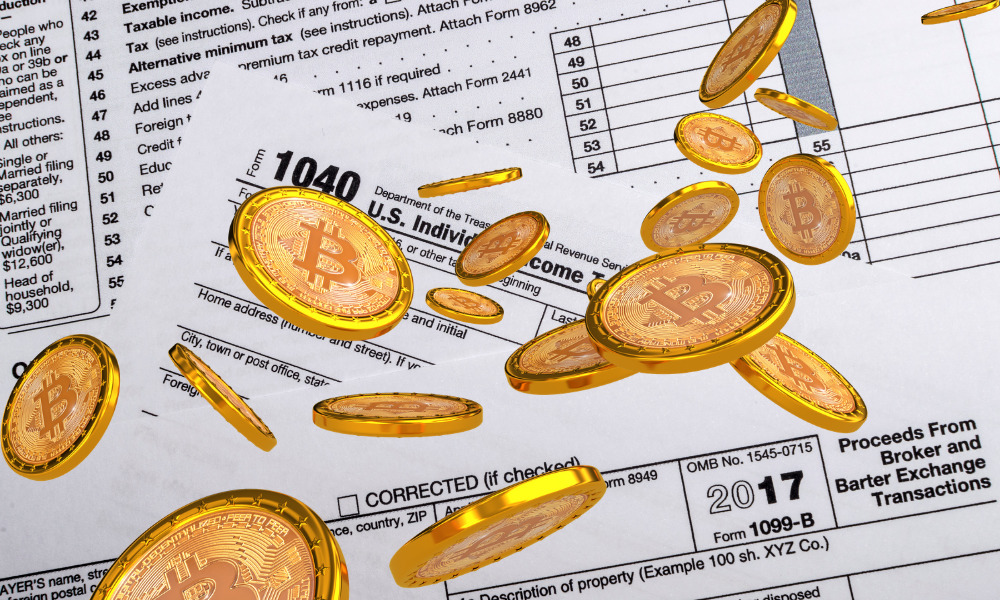Will Traders of Bitcoin And Other Cryptocurrencies Get Hit With Tax Bills Far Larger Than Their Actual Profits?
Many people buying and selling Bitcoin and other cryptocurrencies may be in for a shocking surprise at some point in the future; some such folks may find that they owe much more in taxes than they have actually earned from trading.
The rapid rise in the price of Bitcoin has led to a dramatic increase of interest in cryptocurrencies – and Bitcoin’s much greater price volatility relative to that of traditional investments such as stocks and bonds has led to many people now attempting to “buy on the drops and sell on the ups” – essentially becoming part-time day-traders of Bitcoin and other cryptocurrencies.
While fortunes have been made as such by some folks, others have lost quite a bit of money as well. Either way, however, many traders may eventually receive government demands for much greater sums of taxes than they presently anticipate.
The issue stems from the concept of “wash sales.”
When someone sells an investment such as a stock or bond, she experiences a capital gain (when she sells at a profit) or a capital loss (when she sells at a loss) – with the relevant gain or loss calculated as the difference between the amount of money that she received from selling the investment and the cost that she paid when buying it (adjusted for various factors). Gains and losses are often taxable events – gains can increase the amount of income taxes that a person owes in the year that the relevant gain is experienced, and losses can do the opposite. (I have intentionally oversimplified for the sake of clarity.)
Wash sale rules, however, state that if someone sells certain types of investments and then repurchases an effectively-identical investment within a short period of time, she must recognize any gains achieved from her sale, but, if, on the other hand, she experienced a loss, she may not recognize it – instead any losses are applied to the cost basis of the new purchase, and recognized only at that point in the future when she sells the new acquisition (provided that that sale is not also a wash sale).
Improperly managing wash sales and their impact can lead a trader to suffer from huge tax liabilities – even when losing money; there have been media reports over the years of stock traders who barely earned a living during a calendar year being hit with unexpected million-dollar tax liabilities as a result of wash sales.
Many experts argue that wash sale rules do not apply to cryptocurrencies – these folks point to the fact that the source for wash sale rules in the USA – IRS Code Section 1091 – does not apply to property other than the specific types of securities listed in the code, and that the IRS has, historically speaking, issued guidance declaring “virtual currencies” not to be securities.
While that argument is correct, it is hardly bulletproof – and relying on it may be risky, especially over the long term.
For starters, the laws of some countries do consider cryptocurrencies to be subject to wash sale rules, and, in the world of cryptocurrency, plenty of people are buying and selling on exchanges subject to the reporting regulations of such countries. While many Americans who trade overseas are aware that there are tax consequences of doing so, I have met some who were unaware of the relevant distinction vis-à-vis wash sales. Of course, in many cases, foreign accounting practices may translate for Americans into complicated accounting needs rather than larger tax bills; in some cases, however, Americans trading overseas may, in fact, owe significant sums to other jurisdictions.
Another risk vis-à-vis cryptocurrency wash sales is that the IRS issued the aforementioned guidance (declaring “virtual currencies” not to be securities) in 2014 – which, vis-à-vis cryptocurrencies, is, ancient history. Major changes in circumstance have taken place since that date – for example, the growth by orders of magnitude of the market cap of cryptocurrencies, the number of cryptocurrency investors, and the number of traditional types of investment structures that invest in cryptocurrencies; the IRS or a tax court could reasonably cite such changes as sufficient reason to render the 2014 guidance obsolete. Furthermore, the IRS may feel increasing pressure to treat cryptocurrencies as securities if traders successfully claim “Like Kind Exchange” tax exemptions (IRS Section 1031) by buying and selling cryptocurrencies using other cryptocurrencies, and treating their activities as non-taxable exchanges of similar property rather than as taxable transactions. (There is little doubt that impacted parties are going to challenge and/or attempt to circumvent through the creation of derivatives any IRS rulings that cryptocurrencies that are not securities do not qualify for such exemptions.)
It is also important to understand that the same section 1091 cited above in the argument that cryptocurrencies are not subject to wash sale rules also allows the IRS to unilaterally expand the list of securities that are subject to wash sale rules – does anyone reasonably believe that if the cryptocurrency ecosystem continues upon its current growth trajectory that the IRS will perpetually ignore the tax preference given to cryptocurrencies over more traditional types of investments? Or that nobody at the IRS will ever raise the issue that exempting cryptocurrencies from wash sale rules effectively allows people to make sell-buy transactions for the sole purpose of taking tax losses?
Furthermore, in recent years, the Securities and Exchange Commission has pursued various entities that have run cryptocurrency initial coin offerings (ICOs), claiming that cryptocurrencies can be securities – further opening the door for the IRS to issue a guidance that some or all cryptocurrencies are securities subject to the wash sale rule.
Perhaps even worse than all of the above is the fact that with the nature of cryptocurrencies not clearly defined by law, the IRS could potentially attempt to classify some cryptocurrencies as personal-use property rather than investment property, making all relevant losses – not just those from wash sales – totally not deductible. While such a dramatic move seems unlikely to happen in the case of Bitcoin (although one never knows for sure), the matter may not be as straightforward vis-à-vis the many utility tokens that are marketed as offering their owners the ability to personally use a specific resource.
By now, the federal government should have established clear, detailed, objective, and unchanging criteria that would allow anyone to easily determine the relevant status of a particular cryptocurrency. To date, however, it has not done so. And the resulting lack of clarity, coupled with little word from State governments vis-à-vis any cryptocurrency activities that fall under their respective jurisdictions, opens the door for potential issues. (One cannot help but wonder if elected officials would have long-since addressed many cryptocurrency-related issues had they started receiving political campaign contributions in cryptocurrency.)
In short, tax law is complicated, and, in some cases, possible murkiness vis-à-vis the treatment of cryptocurrencies could create risks. If you plan to trade cryptos, it may be wise to consult your tax advisor not only at tax time, but, even before you commence trading.
(Disclaimer: I wrote this article to raise awareness of something that I perceive as a potential risk. I am not an accountant, and the aforementioned article is for informational purposes only. Tax laws are complicated. I make no representations or guarantees about tax law and its impact on anyone specific or on any specific situations, so, as I noted above, please consult a tax professional before making any decisions.)













 CyberSecurity for Dummies is now available at special discounted pricing on Amazon.
Give the gift of cybersecurity to a loved one.
CyberSecurity for Dummies is now available at special discounted pricing on Amazon.
Give the gift of cybersecurity to a loved one.